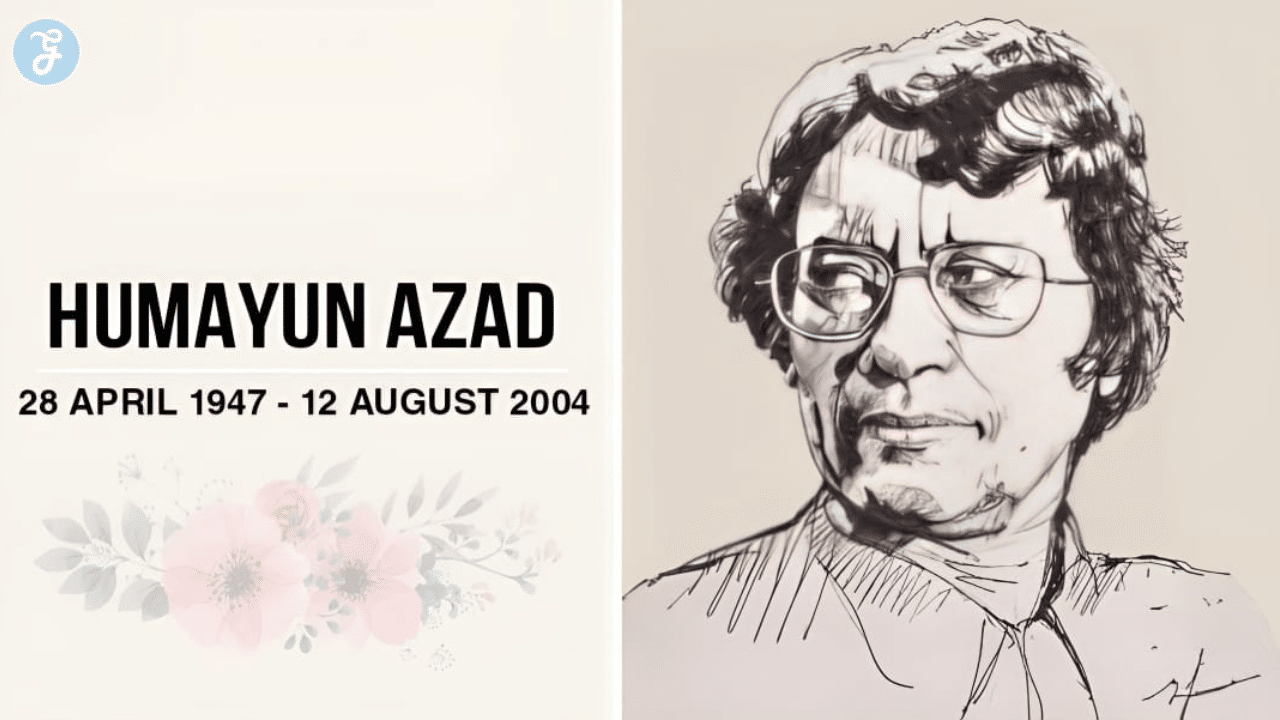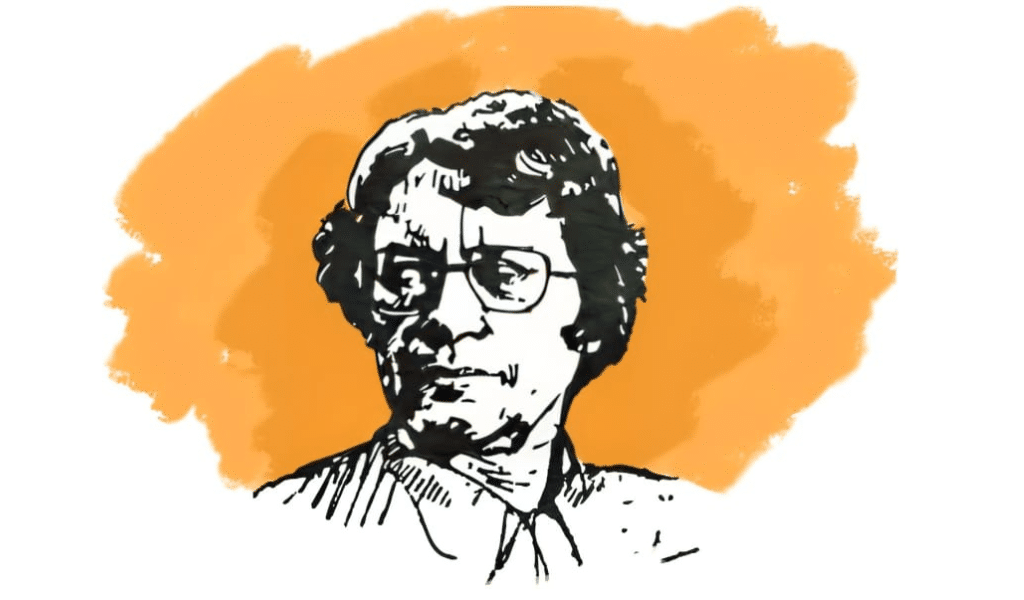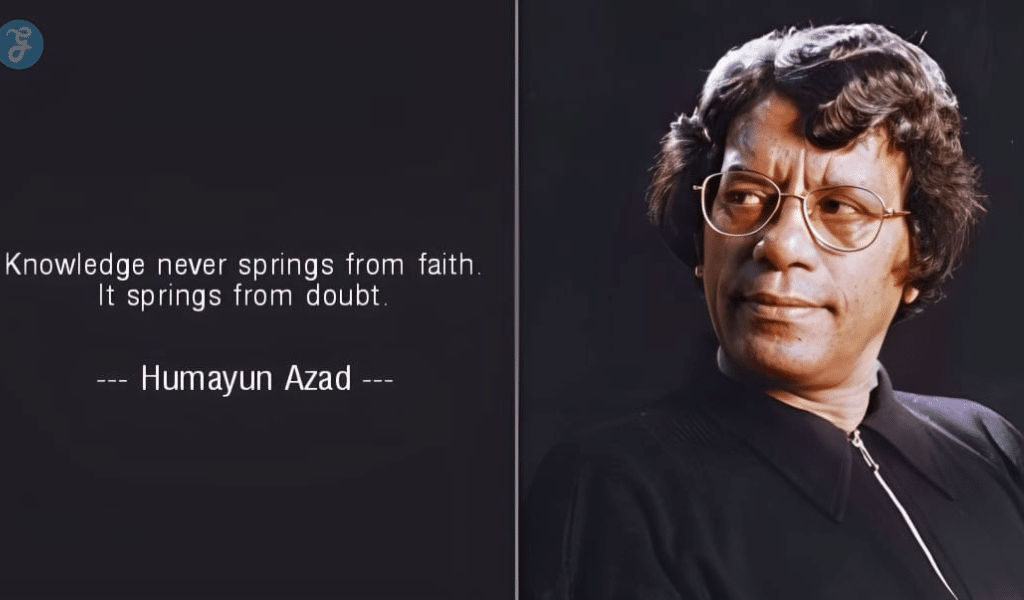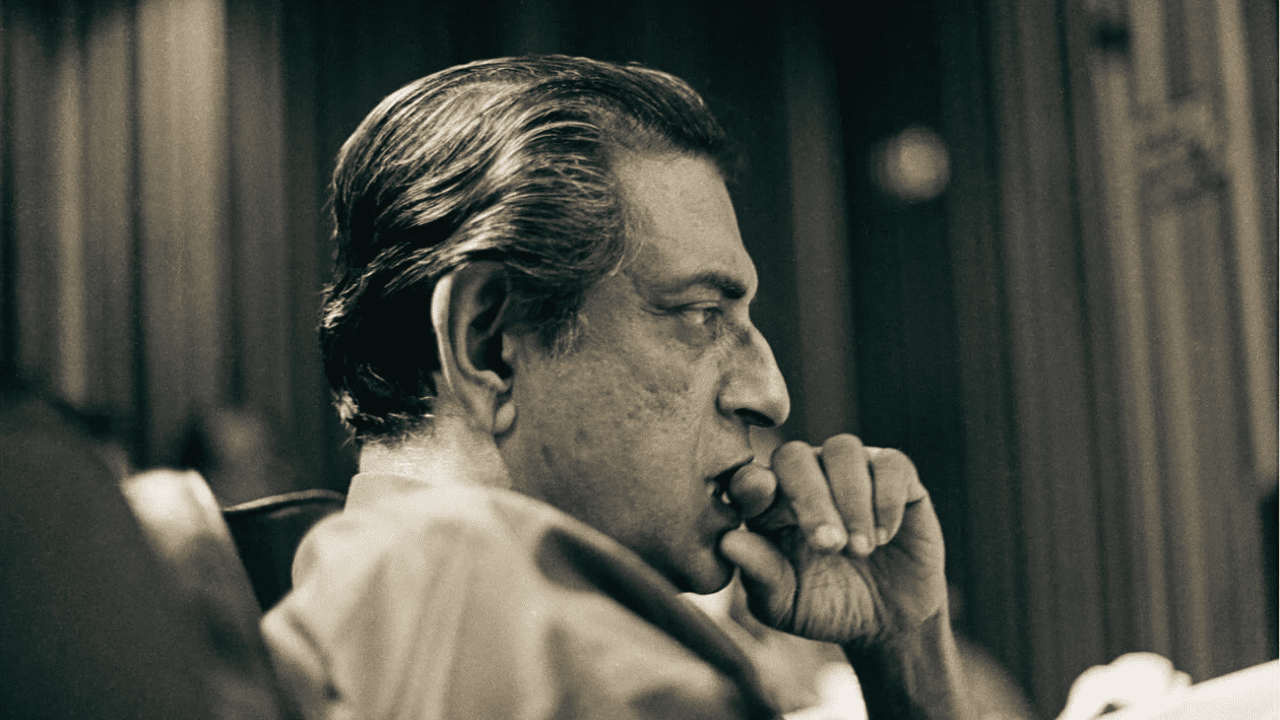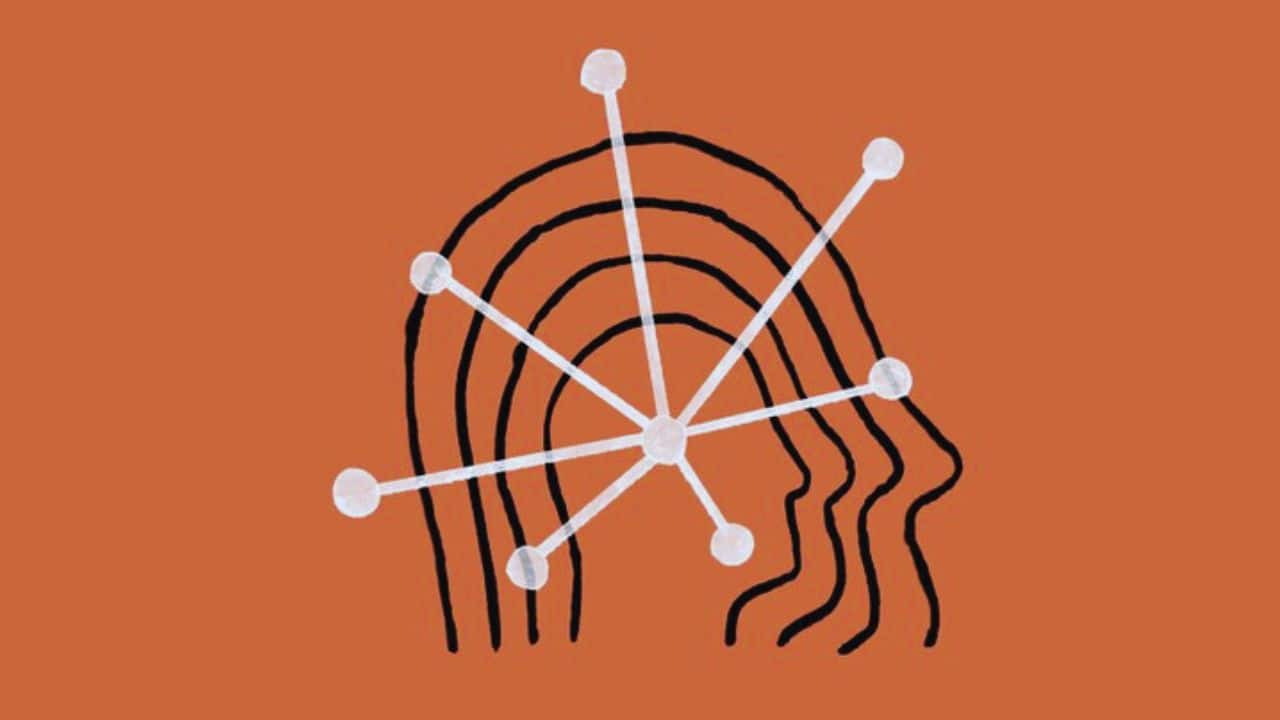Are you familiar with the name Humayun Azad? This trailblazer was a renowned Bangladeshi poet, novelist, and academic who made significant contributions to literature. In this blog post, we’ll delve into his life, work, and the wisdom he left behind as one of Bangladesh’s most influential thinkers.
Ready to explore the legacy of a truly free-thinking genius?
- Humayun Azad was a renowned Bangladeshi poet, novelist, and academic who made significant contributions to literature in Bangladesh.
- He advocated for free – thinking and rationalism, believing that everyone should have their own voice and opinion.
- Despite facing criticism, death threats, and an assassination attempt, Azad continued to fight for his beliefs until his passing.
- His writings continue to inspire intellectuals in Bangladesh today and promote intellectual freedom and open dialogue in society.
Humayun Azad: At a Glance
First, let’s have a quick idea about Humayun Azad
| Life of Humayun Azad | Information |
|---|---|
| Profession | Poet, Novelist, Short-story writer, Critic, Linguist, Columnist, Professor |
| Born | April 28, 1947 |
| Place of Birth | Bikrampur, Bengal Presidency, British India (now in Munshiganj District, Bangladesh) |
| Nationality | Bangladeshi |
| Education | Jagadish Chandra Basu Institute, Dhaka College, University of Dhaka, University of Edinburgh |
| Spouse | Latifa Kohinoor |
| Children | Smita, Mouli, Anannya |
| Died | August 12, 2004 |
| Death Age | 57 Years |
| Death Place | Munich, Germany |
| Resting Place | Munshiganj |
| Notable Works | Laal Neel Deepabali, Chhappanno Hajar Borgomail |
| Notable Awards | Bangla Academy Literary Award, Ekushey Padak |
Humayun Azad: A Brilliant Mind
Humayun Azad’s brilliance shines through his significant contributions to literature and academia, as well as his unwavering advocacy for free thinking and rationalism.
His Contributions to Literature and Academia
Humayun Azad loved words. He wrote many things. He was a poet and a writer. People read his books in Bangladesh and other places too. His book called “Blood Bank” is very famous. He won an award for the way he used Bengali language in his writing.
The Bangla Academy gave him this prize in 1986. In 2012, he also got another award named Ekushey Padak from the Government of Bangladesh because of his great work in literature. Azad did not just write, he taught others too! He worked as a teacher at Dhaka University where students could learn from him every day.
His Advocacy for Free Thinking and Rationalism
Humayun Azad fought for the right to think freely. He held strong views on free thinking and rationalism. This made him stand out in Bangladesh. He believed that everyone must have their own voice and opinion.
Despite threats, he never gave up his beliefs or changed his views. His fight against narrow minds put him at risk many times. Yet, this did not scare him nor make him stop fighting for what he thought was right.
His courage inspires many people in Bangladesh even today.
Humayun Azad’s Life and Career
Humayun Azad, born in 1947 in Bangladesh, had a remarkable life and career marked by his dedication to literature and academia.
Early Life and Education
Humayun Azad grew up in a village. He was born on April 28, 1947, in Rarhikhal village in Bikrampur.
- His early years were spent close to nature.
- His love for the natural beauty of his village was strong.
- A student at Sir J.C. Bose Institution, he studied hard.
- Dhaka College is where he did his higher secondary.
- Dhaka University is where he completed his higher education.
- The lessons from his early life formed his free-thinking mindset.
- A passion for learning pushed him to become an intellectual.
- His years as a student laid the groundwork for his later career as a teacher and writer.
Career as a Writer and Academic
Humayun Azad had an impressive career as both a writer and an academic. Here are some key highlights:
- He started his career as a lecturer in 1969 at Chittagong College before joining Chittagong University.
- He joined the University of Chittagong as a lecturer on 11 February 1970 and Jahangirnagar University in 1972
- At Dhaka University, Azad was known for his independent thinking and unconventional approach.
- He excelled in various literary forms, including poetry, novels, short stories, and criticism.
- Azad authored over sixty books, making him one of the most influential Bengali writers in Bangladesh.
- Alongside his writing, he also held a position as a professor at Dhaka University.
- His expertise extended to linguistics, with an emphasis on the Bangla language and literature.
- Azad’s work often tackled controversial subjects and challenged societal norms.
Controversies and Challenges Faced
Humayun Azad faced criticism and backlash for his outspoken views, including death threats and attempts on his life. He was forced into exile due to the dangerous environment that threatened his freedom of expression.
Criticism and Backlash for His Outspoken Views
Dr. Humayun Azad faced a lot of criticism and backlash for expressing his views openly. His writings challenged the narrow-minded thoughts prevalent in society, which angered militant and extremist groups.
Unfortunately, this led to death threats and even an assassination attempt on Dr. Azad’s life. These actions by Islamist parties showcased the challenges faced by intellectuals who dare to speak their minds in Bangladesh.
Despite facing such opposition, Dr. Azad continued to advocate for free thinking and rationalism until his passing, leaving behind a legacy that inspires others to also stand up for their beliefs and engage in open dialogue.
Assassination Attempt and Exile
In 2004, Humayun Azad became the target of an assassination attempt during the annual Bangla Academy book fair. Two assailants armed with knives attacked him, stabbing him critically.
The attackers believed that Azad had abandoned Islam and targeted him for his views. Before the attack, he had received death threats and even faced threats against his daughter from Islamic fundamentalists.
In order to protect himself, Azad’s son, Ananya Azad, decided to go into self-imposed exile.
Humayun Azad’s Impact on Bangladesh
Humayun Azad’s ideas and writings have had a profound impact on the literary and intellectual scene in Bangladesh, shaping the discourse around free thinking and rationalism.
Influence on the Literary and Intellectual Scene
Humayun Azad had a profound influence on the literary and intellectual scene in Bangladesh. He was considered a genius and his writings left a lasting impact on Bengali literature.
With over sixty books to his name, Azad showcased his versatility as a writer. His works explored various themes and subjects, challenging societal norms and pushing boundaries. However, his outspoken views often led to criticism and even death threats from those who disagreed with him.
Despite the challenges he faced, Azad’s ideas continue to inspire intellectuals in Bangladesh today, promoting free-thinking and open dialogue in society. His legacy lives on through his writings, reminding us of the importance of intellectual freedom and rationalism in shaping our world.
Legacy of His Ideas and Writings
Humayun Azad’s ideas and writings have left a lasting legacy in Bangladesh. His fearless advocacy for free thinking and rationalism continues to inspire many intellectuals and writers in the country.
Azad believed in the power of literature to challenge societal norms and promote critical thinking. He encouraged open dialogue, pushing boundaries, and questioning traditional beliefs.
Azad’s works addressed various social issues, including corruption, military rule, and religious fundamentalism. Through his writing, he sought to promote justice, equality, and freedom of expression.
Even after his tragic assassination attempt and exile from Bangladesh, his ideas continue to resonate with people who value intellectual freedom.
Today, Azad’s teachings are more relevant than ever as Bangladesh faces challenges related to freedom of expression. Intellectuals still face threats for expressing their opinions openly.
It is crucial to remember Humayun Azad’s ideals and strive towards creating a society that embraces diversity of thought and encourages open discourse on important issues.
Freedom of Expression in Bangladesh
Intellectuals in Bangladesh face numerous challenges and threats to their freedom of expression, making it crucial to promote a culture of free-thinking and open dialogue in the country.
Challenges and Threats Faced by Intellectuals
Intellectuals in Bangladesh face numerous challenges and threats to expressing their ideas openly. Dr. Humayun Azad’s assassination attempt is a stark reminder of the vulnerability faced by those who dare to criticize extremist activities.
The attack on him highlights the risks associated with freely expressing one’s views. It is clear that individuals advocating for intellectual freedom are often met with criticism, backlash, and even violence.
This not only silences voices but also hampers the growth of open dialogue and free thinking in society. The government’s efforts to preserve democratic values and allow some degree of freedom of speech should be commended, but more needs to be done to protect intellectuals from such threats.
Importance of Promoting Free-thinking and Open Dialogue
Promoting free thinking and open dialogue is crucial in creating a society that values intellectual freedom. In Bangladesh, individuals like Humayun Azad and his son Ananya Azad have faced threats and attacks for expressing their independent views.
These incidents highlight the need to protect individuals who advocate for freedom of expression. By encouraging free thinking and open dialogue, we can create an environment that fosters creativity, critical thinking, and innovation.
It allows us to explore different perspectives, challenge existing ideas, and find new solutions to problems. Moreover, it helps in combating ignorance, intolerance, and extremism by promoting rationality and understanding among people. Aside from this if you’re interested in Samaresh Majumdar then read the linked article.
Remembering Humayun Azad
Humayun Azad’s life and contributions continue to be commemorated, honoring his significant impact on Bangladeshi culture and the intellectual landscape.
Tributes and Commemorations
Humayun Azad’s contributions to literature and academia continue to be celebrated by many. Here are some of the ways he has been honored:
- Shabdaguchha magazine dedicated an entire issue to Humayun Azad, showcasing his writings and paying tribute to his genius.
- Various literary events and conferences have been organized in Bangladesh to remember and commemorate Humayun Azad’s life and work.
- Many writers, intellectuals, and admirers of Azad continue to discuss his ideas and writings, keeping his legacy alive.
- Scholarships and awards have been established in his name, recognizing his intellectual achievements.
- His books are still widely read and studied, ensuring that his ideas reach new generations of readers.
- In 2006, a documentary film called “Aamar Guru” was made about Humayun Azad’s life, further spreading awareness about his remarkable journey.
Honoring His Contributions to Bangladeshi Culture
Humayun Azad’s contributions to Bangladeshi culture are highly esteemed and deserving of recognition. His thought-provoking writings and fearless criticism of societal flaws have made a lasting impact on Bengali literature.
In acknowledgment of his immense talent, the Government of Bangladesh honored him with the prestigious Ekushey Padak in 2012. Additionally, he was also awarded the Bangla Academy Literary Award in 1986.
Through his work, Humayun Azad enriched the cultural landscape of Bangladesh and inspired future generations with his ideas and ideals.
Humayun Azad’s Literary Works
Humayun Azad was a prolific writer, with numerous notable books and publications to his name, covering a wide range of themes and subjects in his writing.
Notable Books and Publications
Humayun Azad wrote many important books in his career. Here are some notable ones:
- “Pak Sar Jamin Saad Baad” (The Pure Land)
- “Nari” (Woman)
- “Golpo” (Stories)
- “Bangladesher Bhalobasha: Ek Protikriti O Nibedito Samasya” (Love for Bangladesh: A Portrayal and the Associated Problems)
- “Ekhon Hridoy Ami: Kobitar Rangin Patare” (Now I Am My Heart: In the Colored Pages of Poetry)
- “Chhayanot” (The Shadow Note)
Themes and Subjects Explored in His Writing
Humayun Azad’s writing delved into a wide range of themes and subjects, reflecting his diverse interests and perspectives. In his book “I Remember Abbu,” he explores the themes of war, family, innocence, and memory.
This heartfelt work captures the impact of war on individuals and their relationships while also evoking a sense of nostalgia for lost moments. Additionally, Azad’s poetry works like “Jatoi Gobhire Jai Modhu Jatoi Upare Jai Neel” and “Ami Beche Chhilam” delve into personal experiences, emotions, and observations about life.
Through his writing, Humayun Azad invites readers to contemplate various aspects of human existence with depth and sensitivity. Additionally, you can also read about Rabindra Jayanti.
The Relevance of Humayun Azad’s Ideals Today
Humayun Azad’s ideals of intellectual freedom and free thinking are more relevant today than ever, as they emphasize the importance of promoting open dialogue and challenging societal norms.
Importance of Intellectual Freedom in Society
Intellectual freedom is vital for the progress and growth of society. It allows individuals to express their thoughts, ideas, and opinions without fear of retribution or censorship.
When people are free to think critically and openly discuss different perspectives, it leads to innovation, advancements in knowledge, and a deeper understanding of the world around us.
Humayun Azad understood this importance all too well as he fought for intellectual freedom throughout his life. Despite facing criticism and even an assassination attempt, he remained committed to challenging societal norms and advocating for free thinking in Bangladesh.
Continuing the Legacy of Free-thinking and Rationalism
Humayun Azad’s commitment to free thinking and rationalism continues to inspire us today. His advocacy for critical thinking and questioning societal norms encourage us to challenge traditional beliefs and seek knowledge.
Azad’s legacy reminds us of the importance of intellectual freedom in society, where individuals are encouraged to think independently and express their opinions without fear of persecution.
In a world that often discourages dissenting voices, it is vital that we carry on the tradition of free thinking and rationalism championed by Humayun Azad. By embracing these ideals, we can foster an environment where open dialogue and diverse perspectives are valued.
This not only enriches our understanding but also promotes social progress and innovation. If You’re interested also read about Humayun Ahmed
Frequently Asked Questions (FAQs)
Now let’s learn about some common queries on Humayun Azad.
1. Who was Humayun Azad?
Humayun Azad was a renowned Bangladeshi writer, poet, linguist, and professor known for his free-thinking ideas.
2. What made Humayun Azad a genius?
Humayun Azad’s genius stemmed from his exceptional intellect, vast knowledge in various fields, and his ability to think critically and creatively.
3. How did Humayun Azad promote free-thinking?
Humayun Azad promoted free thinking through his writings that challenged societal norms and taboos, encouraged individuality, and advocated for freedom of expression.
4. What impact did Humayun Azad have in Bangladesh?
Humayun Azad had a significant impact in Bangladesh as he inspired many with his progressive ideas, influenced the literary scene, and sparked important discussions about social issues.
Takeaway
Humayun Azad was a brilliant and fearless thinker who made significant contributions to literature and academia in Bangladesh. Despite facing controversies and challenges for his outspoken views, he left an indelible impact on the country’s literary and intellectual scene.
Remembering his legacy serves as a reminder of the importance of promoting freedom of expression and open dialogue in society today.


